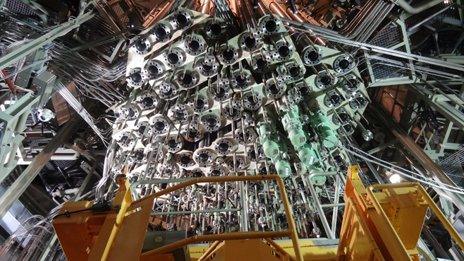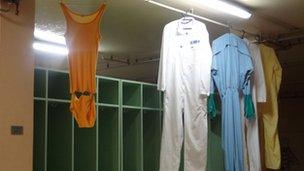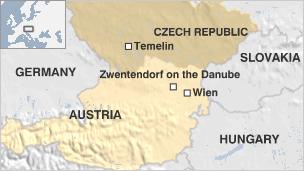Austria and Czech Republic divided over nuclear power
- Published

Austrians voted against nuclear power in a 1979 referendum
The disaster at the Fukushima nuclear plant in Japan last year has re-shaped the debate in Europe on the future of atomic power.
Austria, which has long been anti-nuclear, has called for the continent to abandon nuclear power altogether, but its neighbour, the Czech Republic, is pushing ahead with plans to increase dramatically its production of atomic energy.
The nuclear age ended in Austria before it had begun. Just outside Vienna is the atomic power plant at Zwentendorf on the Danube.
In the late 1970s, it was ready to go into operation. All that was needed was the installation of the fuel rods and the push of a button.
Ghostly dinosaur
But it never went online because the Austrians voted No to nuclear power in a national referendum in 1979.

These days the Zwentendorf plant is used for training courses and as a film set
Today the plant is a ghostly dinosaur. You can walk right up to the walls of the reactor to areas which, in functioning plants, would be radioactive.
These days it is used for safety training courses for nuclear engineers and as a film set.
Stefan Zach from EVN, the energy company which now owns Zwentendorf, says it was an expensive decision - but one that few Austrians regret.
"Over the years Zwentendorf cost about one billion euros [£834m; $1.3bn] but has never produced any nuclear electricity," he said.
"We think it is a perfect symbol for the green, renewable energy future. Since 2005 we have produced solar power at the plant, which provides energy for a few hundred households in the region."
These days Austria wants to play a leading role in stopping nuclear energy throughout Europe. Austrian Environment Minister Nikolaus Berlakovich says safety should come first.
Bethany Bell takes a tour of the Zwentendorf atomic power plant near Vienna, which never went online
"Austria is against nuclear power. After Fukushima it is clear that it is no perspective for Europe or the world. So we see that nuclear power plants are not safe and we are working on an anti-nuclear alliance to find a way for Europe in the future working without nuclear energy."
Seven countries have signed up to the anti-nuclear alliance, including Ireland, Portugal and Greece, but Austria is surrounded by countries that disagree.
Nuclear option
Just over the border in the Czech Republic is the Temelin nuclear plant.
Unlike Germany, which decided to phase out atomic energy after the Fukushima accident, the Czech government is pushing ahead with plans to build two new reactors.

Petr Zavodsky, director of nuclear power plants development at Czech energy group CEZ, says the country has to reduce its dependence on coal.
"We have to think about safe nuclear power because we don't have enough coal to build coal power plants and we don't have space to build hydro.
"So for us it is the only chance, we have to import oil and gas, so safe nuclear power is the only option for the Czech Republic at the moment and we have to reduce CO2 emissions."
Temelin, which was Soviet-designed and upgraded with US technology, has long been a source of friction between Vienna and Prague. Austria has vowed to fight the expansion plans.
But Vaclav Bartuska, the government's special envoy for the completion of Temelin, says the concerns are misplaced.
"It is as safe as most power plants in the world, yes. I think it is the right thing to be afraid or at least respectful of nuclear power.
"And I definitely do not condone those who are fully, 100% pro-nuclear without thinking of the possible risks or consequences. And I am definitely glad we have neighbours like Austria or possibly Germany who are very careful, sometime negative and very precise. It is good to have them."
Mr Bartuska says "the final decision about Temelin" will be made in Prague, not in Brussels or Vienna.
The Czech Republic says expanding atomic power is crucial to its energy security.
Some Czechs feel that Austrian attitudes towards their nuclear programme are unrealistic and tinged with old, anti-Soviet prejudice. But many Austrians feel that they are on the right side of history.
Europe's nuclear debate is far from over.
- Published30 May 2011
- Published25 April 2011
- Published23 March 2011
- Published3 January 2012